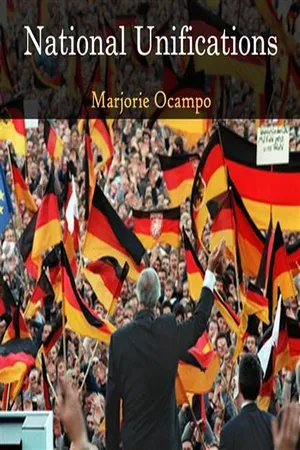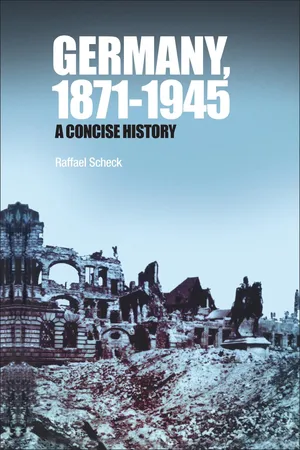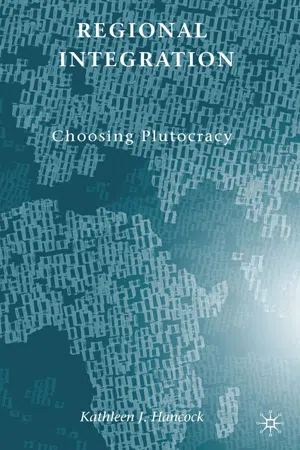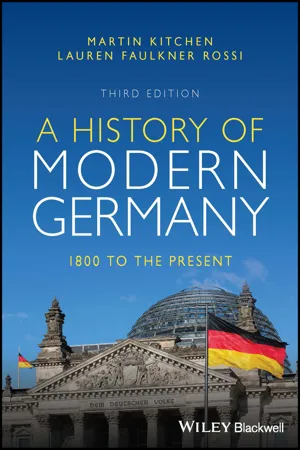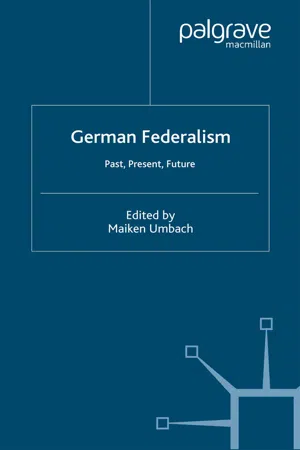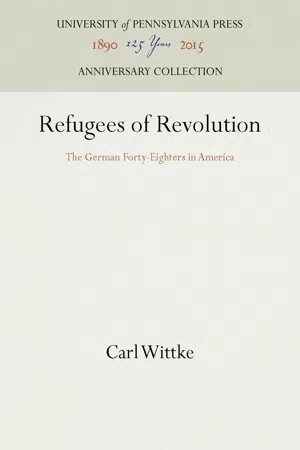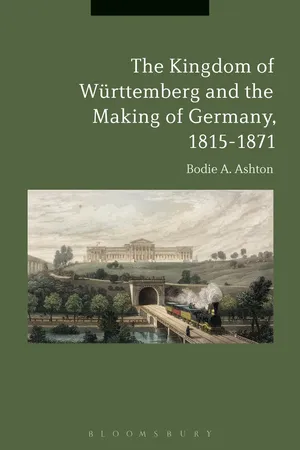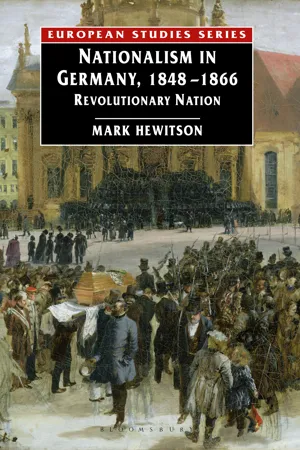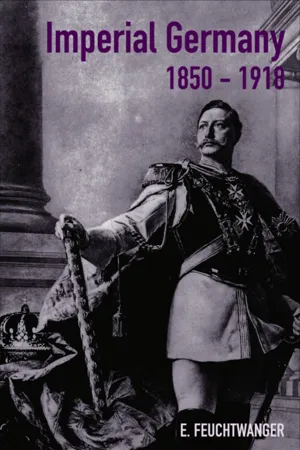History
The German Unification
The German Unification refers to the process by which the various independent states of Germany were unified into a single nation-state in the 19th century. This was largely achieved through the leadership of Otto von Bismarck, who utilized diplomacy and military force to bring about unification. The resulting German Empire emerged as a powerful and influential force in Europe.
Written by Perlego with AI-assistance
Related key terms
1 of 5
9 Key excerpts on "The German Unification"
- No longer available |Learn more
- (Author)
- 2014(Publication Date)
- University Publications(Publisher)
________________________ WORLD TECHNOLOGIES ________________________ Chapter 1 Unification of Germany The German Empire of 1871–1918. By excluding the German-speaking part of the multinational Austrian Empire, this geographic construction represented a little Germany solution. The formal unification of Germany into a politically and administratively integrated nation state officially occurred on 18 January 1871 at the Versailles Palace's Hall of Mirrors in France. Princes of the German states gathered there to proclaim Wilhelm of Prussia as Emperor Wilhelm of the German Empire after the French capitulation in the Franco-Prussian War. Unofficially, the transition of most of the German-speaking populations into a federated organization of states occurred over nearly a century of experimentation. Unification exposed several glaring religious, linguistic, social, and ________________________ WORLD TECHNOLOGIES ________________________ cultural differences between and among the inhabitants of the new nation, suggesting that 1871 only represents one moment in a continuum of the larger unification processes. The Holy Roman Empire of the German Nation, which had included more than 300 independent states, was effectively dissolved when Emperor Francis II abdicated (6 August 1806) during the War of the Third Coalition. Despite the legal, administrative, and political disruption associated with the end of the Empire, the people of the German-speaking areas of the old Empire had a common linguistic, cultural and legal tradition further enhanced by their shared experience in the French Revolutionary and Napoleonic Wars. European liberalism offered an intellectual basis for unification by challenging dynastic and absolutist models of social and political organization; its German manifestation emphasized the importance of tradition, education, and linguistic unity of peoples in a geographic region. - eBook - PDF
Germany, 1871-1945
A Concise History
- Raffael Scheck(Author)
- 2008(Publication Date)
- Berg Publishers(Publisher)
The demand for national unification was powerfully revived in the late 1850s as a consequence of industrial and economic development. After 1850 the industrial German Unification • 15 revolution in some German lands entered its takeoff phase. New factories were built at a breath-taking rate, the production of textiles and iron soared, railroads started to connect many distant regions, and coal production and export reached record levels every year. These advances profited from a high level of education, the result of an advanced school and university system, particularly in Prussia, which had the highest literacy rate and exemplary schools as a result of the reforms undertaken in the wake of the defeat against Napoleon. Industrialization was accompanied by rapid population growth, urbanization, and the expansion of the middle classes and of the industrial working class, the proletariat. After having lagged economically behind western Europe for three centuries, the German lands caught up within a few decades. Economic progress was most powerful in Prussia but less impressive in Austria. At the Congress of Vienna, Prussia had received areas that turned out to be enormously beneficial for industrialization, namely the Ruhr district, the Rhineland, and parts of Saxony – all with rich coal deposits. Ironically, the Prussian king, still focused on eastward expansion into Polish territories, had not initially wanted these territories, whose economic value nobody in Vienna seems to have appreciated. The Congress of Vienna, with just as little awareness, also set up Prussia as a future champion of German unification through another territorial stipulation: it divided Prussia into one large eastern part and a smaller western part, the latter containing the Rhineland and the Ruhr, the area with the highest concentration of industry by the 1850s. - eBook - PDF
Regional Integration
Choosing Plutocracy
- K. Hancock(Author)
- 2009(Publication Date)
- Palgrave Macmillan(Publisher)
26 U n i t i n g t h e G e r m a n s 69 Condition 2: Coalition with Geostrategic Ambition There is no question that Prussian leaders viewed their state as both deserving and capable of regional dominance, so long as they wisely played their cards. The kings who ruled during the design, develop- ment, and expansion of the customs unions—Friedrich Wilhelm III (1797–1840) and Friedrich Wilhelm IV (1840–1861)—believed in this vision. The customs union’s chief architect, Finance Minister Friedrich Christian Adolph von Motz (1825–1830), was an enthu- siastic supporter, and the name “Otto von Bismarck” (Minister- President of Prussia, 1862–1890, and Imperial Chancellor of the German Empire, 1871–1890) is nearly synonymous with a Prussian- driven united Germany. Even as they believed fervently in the goal of uniting Germany under Prussia, they were aware of the necessity of portraying Prussia as a fair, nonaggressive leader who would bring prosperity to a united German people. These key players were acutely affected by the larger strategic and ideological issues of the time. They worried incessantly about Austria as a contender to the leadership position and about whether France might again attack their lands. The historical context, in which European states were frequently at war with one another, alliances Figure 4.1 Map of Prussian Zollverein up to 1834 70 R e g i o n a l I n t e g r at i o n forming and breaking in a matter of years or even months, is critical to understanding the emergence and success of the Zollverein. The Prussian political coalition had three interconnected goals: first, it wanted to unite the Prussian lands that Napoleon had separated; second, it wanted to isolate Austria from the rest of the German states; and finally, it wanted to protect itself against both the state of France and the liberal ideas spreading from that state into the rest of Europe. Goal of Uniting Prussian Land Like many of the German states, Prussia had odd borders. - eBook - PDF
A History of Modern Germany
1800 to the Present
- Martin Kitchen, Lauren Faulkner Rossi(Authors)
- 2023(Publication Date)
- Wiley-Blackwell(Publisher)
A History of Modern Germany: 1800 to the Present, Third Edition. Martin Kitchen and Lauren Faulkner Rossi. © 2024 Martin Kitchen and Lauren Faulkner Rossi. Published 2024 by John Wiley & Sons Ltd. THE UNIFICATION OF GERMANY 1866–1871 CHAPTER SIX CHAPTER CONTENTS Liberalism, Nationalism, and Particularism 93 The Franco-Prussian War 94 The German Empire 96 Bonapartism 99 The Military and Militarism 101 Nationalism 104 The German Jewish Community 105 THE UNIFICATION OF GERMANY: 1866–1871 91 The Prussian victory at Königgrätz left many contemporaries dazed and confused. The arch-reactionary, militaristic Junker Bismarck, who had trampled on the Prussian constitution, had begun the war with a call for a national parliament based on universal suffrage, thus partially realizing the ambitions of the Little German bourgeoisie. But elections held in Prussia on the same day as this decisive battle resulted in a crushing defeat for the liberals. There was considerable amazement when Bismarck asked the Landtag for an indemnity for the expenditure that it had refused to sanction during the constitutional crisis. It was a masterly move. Most conservatives were delighted that he had made no apology for what he had done, thereby implying that he would do it again if necessary. Many liberals found some comfort in that he thus acknowledged that he had ignored parliamentary rights. The indemnity made an alliance between moderate conservatives and (the newly formed) National Liberals possible. The “Old Conservatives” (as the ultra-conservatives styled themselves) were appalled that Bismarck was swimming with the tide of nationalism, constitutionalism, and parliamentari- anism. They remained adamant in their opposition to his domestic Realpolitik. On the other side a number of liberals found it equally impossible to swallow Bismarck’s Bonapartist strategy and the cynicism of the indemnity. - eBook - PDF
German Federalism
Past, Present and Future
- M. Umbach(Author)
- 2002(Publication Date)
- Palgrave Macmillan(Publisher)
2 Nevertheless, the situation of German and Germany is not unusual in central and eastern Europe, although it is quite different from the situation in Britain, in that it is characterized by what has been called a ‘vertical ethnic community’, with the majority defined on linguistic (in other places on religious) grounds and which typically has ‘chronic difficulty in defining and maintaining a clear national territory’. 3 In a popular view, the course of German history in the nineteenth century led to the Reichsgründung of 1871 as the fulfilment of an ulti- mately unstoppable popular demand among the German people for a nation-state which represented their inevitable historical destiny. In the short term this was the culmination of a movement which had begun in the Napoleonic wars, but in fact it reflected the fulfilment of a national destiny which had been thwarted in the later Middle Ages Political Unity and Linguistic Diversity in 19th-Century Germany 93 by the breakdown of the Holy Roman Empire after Barbarossa’s reign. The ultimate result of this was the wholly unjustified delay in the for- mation of a German nation-state, for which foreign interference had been largely responsible, but this had been overcome and the German people at last had the state which had always been their due. The justification for this state was essentially ethnic-linguistic: the peoples of the new Reich were linked by a common language, and they had been conscious of the unity of this language called deutsch for over a thousand years – in effect back to the first written records of this lan- guage and the Carolingian empire, which itself had been the first unified German state. 4 This grossly simplified presentation would be challenged by most historians nowadays, 5 but its teleology is superficially plausible and aspects of it are remarkably persistent. - eBook - PDF
Refugees of Revolution
The German Forty-Eighters in America
- Carl Wittke(Author)
- 2016(Publication Date)
19 The German element became as united in America during the Franco-German War as did Germany itself. The war was not regarded as a war of dynasties, but as a war between the Romance and the Teutonic peoples. France, after four years of diplomatic sparring, had impudently broken the peace, and forced peaceful Germans to take up arms. 20 By 1870 many Forty-eighters were approaching the twilight of their careers on two continents. On some issues, as preceding chapters have shown, they had been a group apart from the total German immigration. But now, with few exceptions, they joined the great majority of German-Americans in blessing the German army and the new Germany under Prussia, Bismarck, and the Hohenzollerns. They had envisaged the uni-fication of the German states along quite different lines, but their dis-appointment was largely forgotten in the universal rejoicing that hailed the final achievement of a united fatherland. Franz Sigel never revisited Germany and stubbornly refused to par-ticipate in birthday celebrations of a German Emperor who as King of Prussia had shot down his comrades at Rastatt in 1848. But even Sigel welcomed unification when it came, and the Baltimore Wecer in 1870 proposed sending him as a spokesman for the Germans of the United States to the German army, but Sigel tactfully suggested that German-Americans could be more helpful in other ways. 21 Wilhelm Rapp, once imprisoned for high treason, and a lifelong exponent of Turner ideals, defended Prussia's leadership with enthusiasm in 1871 in an address in Chicago to the veterans of 1848, arguing that liberals must yield their former ideals in this sternly realistic age, and abandon their hopes for a universal brotherhood like a beautiful and foolish dream. He ap-proved the methods of German unification and concluded that popular liberties could only be achieved gradually. 22 Friedrich Hecker, in the main address at a victory celebration in St. Louis in 1871, described the - Bodie A. Ashton(Author)
- 2017(Publication Date)
- Bloomsbury Academic(Publisher)
100 By 1870, even before the Ems Despatch escalated the sabre-rattling between Berlin and Paris, and well before the first actions of the Franco-Prussian War, Stuttgart had acknowledged that the nation of Germany existed in everything but a binding legal sense. This unification, according to contemporary sources as distinct from one another as the British Foreign Office and the popular American news media, had effectively been completed before war broke out between Germany and France. 101 That reality was clearly indicated by the words and deeds of the Württemberg state minister. The Kingdom of Württemberg and the Making of Germany, 1815–1871 146 These acts may have been in the realm of high politics. But Württemberg politics rarely diverged from the public will. The decision to join in united Germany had already been made by December 1870; nevertheless, it was this, and the public enthusiasm for it, that became a decisive issue in the Landtag election campaigns of that month. The Deutsche Partei demonstrated how important the German Question was by topping its pamphlets and advertisements with the simple question: ‘ Are you in favour of joining the North German Confederation?’ The reaction from the Württemberg voting public was a resounding yes. When the ballots were counted, the Deutsche Partei suddenly found itself in the majority. Meanwhile, the Volkspartei , in spite of the best efforts of its newspaper benefactor, the Beobachter , saw its parliamentary majority shrink to a definite minority; Volkspartei and political Greater Germanists in the Landtag now found themselves with just seventeen seats. 102 One month later, on 18 January 1871, King Wilhelm of Prussia was crowned German emperor in a ceremony in the Hall of Mirrors in Versailles – a coronation that met with the conspicuous approval not just of the power brokers in Stuttgart, but also the Württemberg population as a whole.- eBook - PDF
Nationalism in Germany, 1848-1866
Revolutionary Nation
- Mark Hewitson(Author)
- 2010(Publication Date)
- Bloomsbury Academic(Publisher)
Only Prussia can construct the new building, and it has the sacred duty of doing so … The urge of the German Volk towards state unity, power and security is not revolutionary, but moral and justified. The right to be a Volk again is so primordial, PRUSSIA, THE NATION AND THE CONSTITUTION 231 so timeless and inalienable, of such divine origin, that the right of princes to keep Germany fragmented and dependent on foreign lands cannot oppose it … The German Volk demands nothing new, something which never existed; it is asking for that which it possessed for a thousand years … Without Germany, there is no political future for Prussia and the Hohenzollern dynasty, and without Prussia, Germany will succumb unfailingly to the fate of Poland … The most daring policy is the most certain and least dangerous for Prussia. 34 To the founders of the Fortschrittspartei , the interests of the Prussian people, like those of other German populations, were identical to those of Germany. The Abgeordnetentag intended to unite these populations through their party representatives in a form of German Vorparlament. In a similar vein, the free-trade Kongress deutscher Volkswirte aimed, in the words of one of its leaders, to repre-sent, ‘not single estates, but the economic interests ... of the entire German fatherland’, and the Deutscher Handelstag , which was a federal organisation of individual chambers of commerce, hoped to achieve ‘unity in a commercial context’, since economic unity, unlike its political counterpart, did not affect the sovereign rights of the German princes’, in the estimation of its founder. 35 As in 1848, leaders anticipated the creation of a German market, National Assembly and central power. The striking confidence of liberal leaders in advancing their national claims after 1858, in contrast to their hesitancy during the 1850s, was partly the corollary of large-scale democratic participa-tion in politics for the first time since 1849. - eBook - ePub
- Edgar Feuchtwanger(Author)
- 2002(Publication Date)
- Routledge(Publisher)
The big question that historians have raised and answered in different ways is whether those Liberals who had accepted the indemnity law and now the new constitution had sold their soul for a mess of pottage. There are those who argue that the question must not be answered with benefit of hindsight. It was not be foreseen in 1867 that doubts about the liberal vision of progress and enlightenment would spread far beyond Germany. The Prussian Liberals who made their peace with Bismarck, the National Liberals, could feel that much of what they wanted had been achieved. Unity had come before freedom, but freedom could only be achieved in a united country, not in the dwarf states into which Germany had hitherto been divided. Much could still be achieved under the new dispensation and was indeed achieved, especially in the social and economic sphere. A genuinely unified system of law would emerge from the collaboration of the National Liberals with the Bismarck government in the next decade. What were the alternatives? If the liberal movement had remained in rigid opposition history would have by-passed it.These arguments of the National Liberals and of many contemporary and subsequent commentators were realistic enough. Nevertheless nothing could disguise the fact that the Prussian army had won and that Bismarck had largely imposed his own constitutional solution on the new North German Confederation, soon to become the German empire. The perpetuation of the power of the Prussian military monarchy and thereby of his own power was his objective. He had made it acceptable by some clever window-dressing, perhaps by some concessions that would take him further downstream into a modern industrial urban society than he bargained for. But the expectation that a unified Germany would be a state on the western parliamentary model, with a government responsible to the representatives of the electorate, a state in which a government so constituted would have unequivocal control over all spheres of public policy, including the military, was not fulfilled and was never to be fulfilled before the First World War destroyed the empire. The liberals hoped that there would soon be a time after Bismarck when their visions of the future would be realized, but when the time came it was a quarter of a century on and the situation was very different. Meanwhile Bismarck remained dominant and his only use for parliaments and parties was to reinforce his own dominance.
Index pages curate the most relevant extracts from our library of academic textbooks. They’ve been created using an in-house natural language model (NLM), each adding context and meaning to key research topics.
